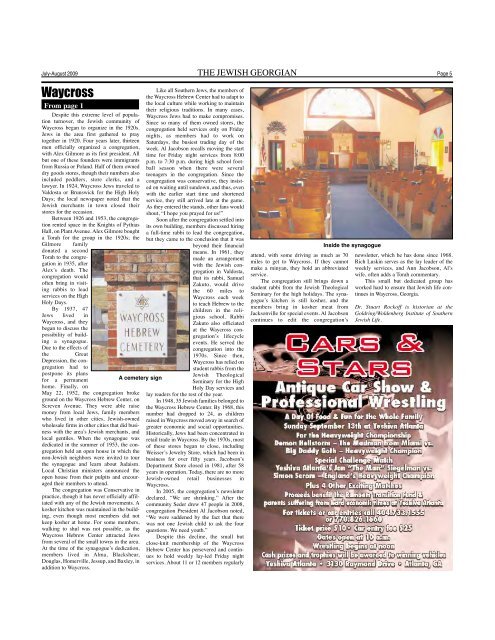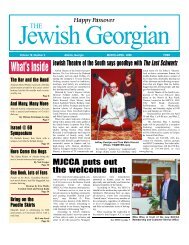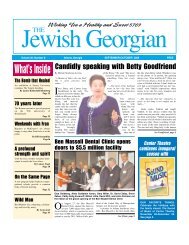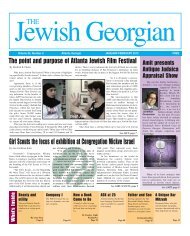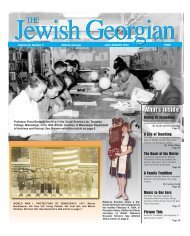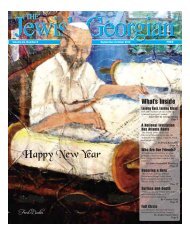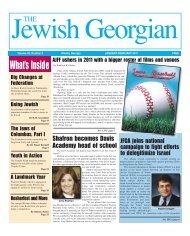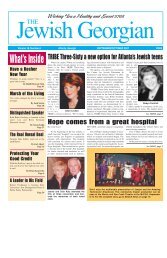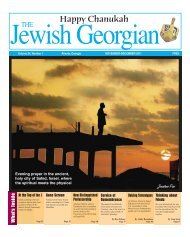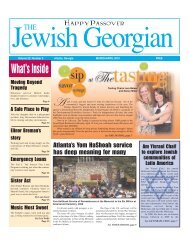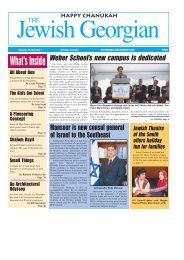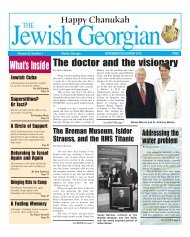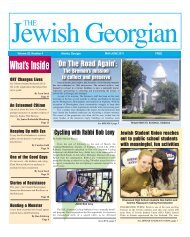JGA July-August 09 - The Jewish Georgian
JGA July-August 09 - The Jewish Georgian
JGA July-August 09 - The Jewish Georgian
You also want an ePaper? Increase the reach of your titles
YUMPU automatically turns print PDFs into web optimized ePapers that Google loves.
<strong>July</strong>-<strong>August</strong> 20<strong>09</strong> THE JEWISH GEORGIAN Page 5<br />
Waycross<br />
From page 1<br />
Despite this extreme level of population<br />
turnover, the <strong>Jewish</strong> community of<br />
Waycross began to organize in the 1920s.<br />
Jews in the area first gathered to pray<br />
together in 1920. Four years later, thirteen<br />
men officially organized a congregation,<br />
with Alex Gilmore as its first president. All<br />
but one of these founders were immigrants<br />
from Russia or Poland. Half of them owned<br />
dry goods stores, though their numbers also<br />
included peddlers, store clerks, and a<br />
lawyer. In 1924, Waycross Jews traveled to<br />
Valdosta or Brunswick for the High Holy<br />
Days; the local newspaper noted that the<br />
<strong>Jewish</strong> merchants in town closed their<br />
stores for the occasion.<br />
Between 1926 and 1953, the congregation<br />
rented space in the Knights of Pythias<br />
Hall, on Plant Avenue. Alex Gilmore bought<br />
a Torah for the group in the 1920s; the<br />
Gilmore family<br />
donated a second<br />
Torah to the congregation<br />
in 1935, after<br />
Alex’s death. <strong>The</strong><br />
congregation would<br />
often bring in visiting<br />
rabbis to lead<br />
services on the High<br />
Holy Days.<br />
By 1937, 47<br />
Jews lived in<br />
Waycross, and they<br />
began to discuss the<br />
possibility of building<br />
a synagogue.<br />
Due to the effects of<br />
the Great<br />
Depression, the congregation<br />
had to<br />
postpone its plans<br />
for a permanent<br />
home. Finally, on<br />
May 22, 1952, the congregation broke<br />
ground on the Waycross Hebrew Center, on<br />
Screven Avenue. <strong>The</strong>y were able raise<br />
money from local Jews, family members<br />
who lived in other cities, <strong>Jewish</strong>-owned<br />
wholesale firms in other cities that did business<br />
with the area’s <strong>Jewish</strong> merchants, and<br />
local gentiles. When the synagogue was<br />
dedicated in the summer of 1953, the congregation<br />
held an open house in which the<br />
non-<strong>Jewish</strong> neighbors were invited to tour<br />
the synagogue and learn about Judaism.<br />
Local Christian ministers announced the<br />
open house from their pulpits and encouraged<br />
their members to attend.<br />
<strong>The</strong> congregation was Conservative in<br />
practice, though it has never officially affiliated<br />
with any of the <strong>Jewish</strong> movements. A<br />
kosher kitchen was maintained in the building,<br />
even though most members did not<br />
keep kosher at home. For some members,<br />
walking to shul was not possible, as the<br />
Waycross Hebrew Center attracted Jews<br />
from several of the small towns in the area.<br />
At the time of the synagogue’s dedication,<br />
members lived in Alma, Blackshear,<br />
Douglas, Homerville, Jessup, and Baxley, in<br />
addition to Waycross.<br />
A cemetery sign<br />
Like all Southern Jews, the members of<br />
the Waycross Hebrew Center had to adapt to<br />
the local culture while working to maintain<br />
their religious traditions. In many cases,<br />
Waycross Jews had to make compromises.<br />
Since so many of them owned stores, the<br />
congregation held services only on Friday<br />
nights, as members had to work on<br />
Saturdays, the busiest trading day of the<br />
week. Al Jacobson recalls moving the start<br />
time for Friday night services from 8:00<br />
p.m. to 7:30 p.m. during high school football<br />
season when there were several<br />
teenagers in the congregation. Since the<br />
congregation was conservative, they insisted<br />
on waiting until sundown, and thus, even<br />
with the earlier start time and shortened<br />
service, they still arrived late at the game.<br />
As they entered the stands, other fans would<br />
shout, “I hope you prayed for us!”<br />
Soon after the congregation settled into<br />
its own building, members discussed hiring<br />
a full-time rabbi to lead the congregation,<br />
but they came to the conclusion that it was<br />
beyond their financial<br />
means. In 1961, they<br />
made an arrangement<br />
with the <strong>Jewish</strong> congregation<br />
in Valdosta,<br />
that its rabbi, Samuel<br />
Zakuto, would drive<br />
the 60 miles to<br />
Waycross each week<br />
to teach Hebrew to the<br />
children in the religious<br />
school. Rabbi<br />
Zakuto also officiated<br />
at the Waycross congregation’s<br />
lifecycle<br />
events. He served the<br />
congregation into the<br />
1970s. Since then,<br />
Waycross has relied on<br />
student rabbis from the<br />
<strong>Jewish</strong> <strong>The</strong>ological<br />
Seminary for the High<br />
Holy Day services and<br />
lay readers for the rest of the year.<br />
In 1948, 35 <strong>Jewish</strong> families belonged to<br />
the Waycross Hebrew Center. By 1968, this<br />
number had dropped to 24, as children<br />
raised in Waycross moved away in search of<br />
greater economic and social opportunities.<br />
Historically, Jews had been concentrated in<br />
retail trade in Waycross. By the 1970s, most<br />
of these stores began to close, including<br />
Weisser’s Jewelry Store, which had been in<br />
business for over fifty years. Jacobson’s<br />
Department Store closed in 1981, after 58<br />
years in operation. Today, there are no more<br />
<strong>Jewish</strong>-owned retail businesses in<br />
Waycross.<br />
In 2005, the congregation’s newsletter<br />
declared, “We are shrinking.” After the<br />
community Seder drew 47 people in 2008,<br />
congregation President Al Jacobson noted,<br />
“We were saddened by the fact that there<br />
was not one <strong>Jewish</strong> child to ask the four<br />
questions. We need youth.”<br />
Despite this decline, the small but<br />
close-knit membership of the Waycross<br />
Hebrew Center has persevered and continues<br />
to hold weekly lay-led Friday night<br />
services. About 11 or 12 members regularly<br />
attend, with some driving as much as 70<br />
miles to get to Waycross. If they cannot<br />
make a minyan, they hold an abbreviated<br />
service.<br />
<strong>The</strong> congregation still brings down a<br />
student rabbi from the <strong>Jewish</strong> <strong>The</strong>ological<br />
Seminary for the high holidays. <strong>The</strong> synagogue’s<br />
kitchen is still kosher, and the<br />
members bring in kosher meat from<br />
Jacksonville for special events. Al Jacobson<br />
continues to edit the congregation’s<br />
Inside the synagogue<br />
newsletter, which he has done since 1968.<br />
Rich Luskin serves as the lay leader of the<br />
weekly services, and Ann Jacobson, Al’s<br />
wife, often adds a Torah commentary.<br />
This small but dedicated group has<br />
worked hard to ensure that <strong>Jewish</strong> life continues<br />
in Waycross, Georgia.<br />
Dr. Stuart Rockoff is historian at the<br />
Goldring/Woldenberg Institute of Southern<br />
<strong>Jewish</strong> Life.


